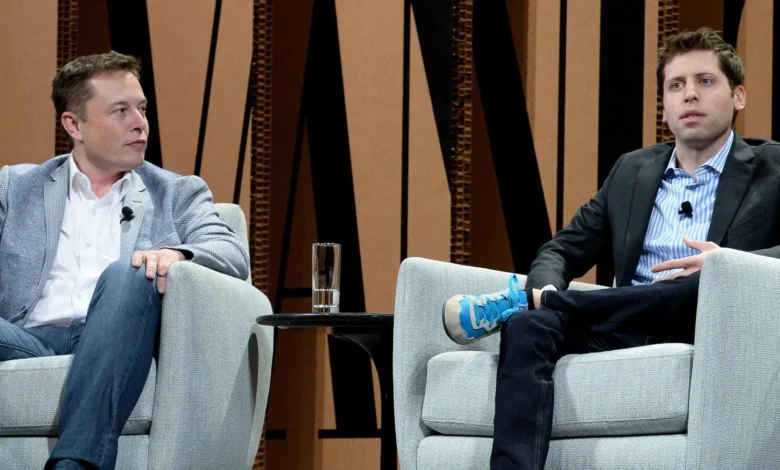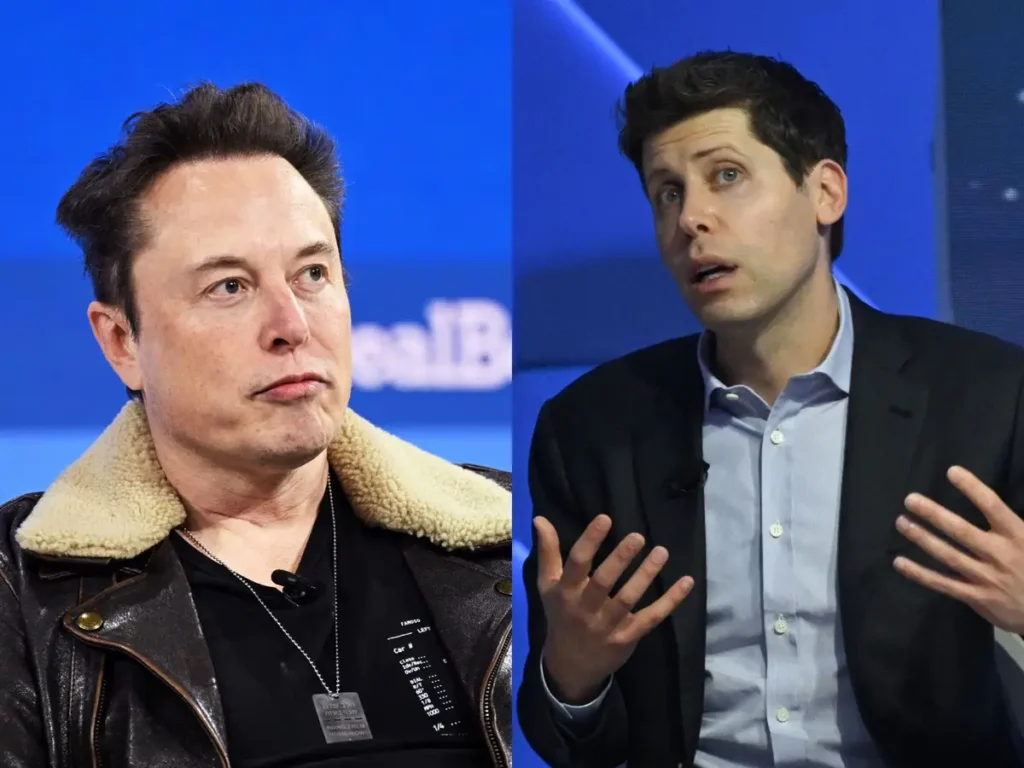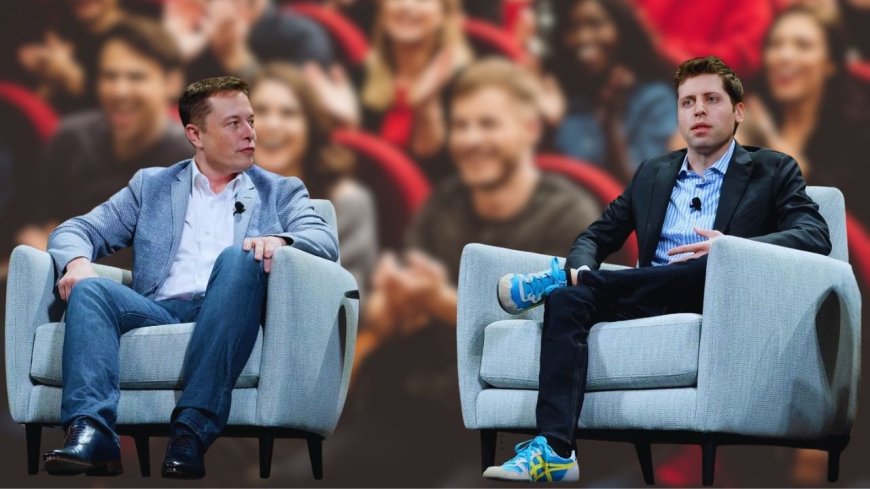Sam Altman Elon Musk: A Complex Partnership That Shaped AI | Co-Founders to Rivals

Sam Altman Elon Musk: The Partnership, The Schism, and The Battle for AI’s Future
The story of modern artificial intelligence is inextricably linked to two of the most visionary and controversial figures in tech: Sam Altman Elon Musk. Their partnership birthed one of the most influential organizations in the world, OpenAI. Their subsequent schism ignited one of its most fascinating rivalries. To understand the current AI landscape—its ambitions, its fears, and its corporate battles—one must first understand the complex relationship between these two titans.
This is not just a tale of a business breakup. It’s a story of clashing philosophies, diverging strategies, and a fundamental disagreement on how to safeguard humanity’s future against the very technology they helped unleash.
The Genesis: A Shared Fear and a Grand Ambition (2015)

In the mid-2010s, the conversation around AI was dominated by optimistic forecasts from Google and Facebook. However, a small group of thinkers, including Sam Altman Elon Musk, viewed the rapid, unchecked advancement of artificial intelligence with deep apprehension.
Their core belief was a simple but terrifying one: if left solely in the hands of for-profit corporations, the development of Artificial General Intelligence (AGI)—AI that surpasses human intelligence—could become an existential threat to humanity. A profit-driven race might prioritize speed over safety, leading to catastrophic outcomes.
This shared fear was the catalyst. In 2015, Elon Musk (then already famous for Tesla and SpaceX) and Sam Altman (the young, respected president of the legendary startup accelerator Y Combinator) came together to co-found OpenAI. They were joined by other prominent tech figures like Ilya Sutskever and Greg Brockman.
The organization’s founding principle was radical and idealistic: to develop AGI “in a way that is most likely to benefit humanity as a whole, unconstrained by a need to generate financial return.” It was established as a non-profit, with its research open-sourced for the world to see and build upon. Musk and Altman were the public faces of this mission, with Musk providing the initial funding and grand vision, and Altman providing the operational savvy and deep connections to Silicon Valley’s talent pool.
The Early Vision: Open-Source and Non-Profit
The name said it all: OpenAI. The intent was to be a counterweight to the “closed” AI research of Google’s DeepMind. By making its findings public, it would ensure that power over this transformative technology was distributed, not concentrated. Musk, in particular, was vocal about the dangers of a single company achieving a monopoly on AGI.
The Cracks Begin to Show: Diverging Paths
The first major crack in this partnership appeared in 2018. Elon Musk resigned from OpenAI’s board. Officially, the reason cited was a “potential future conflict of interest” with Tesla’s own AI development for self-driving cars. However, insiders and subsequent reporting have pointed to a deeper, more philosophical rift.
Reports suggest that Musk pushed for a more hands-on, controlling role in OpenAI, which the rest of the board, including Altman, resisted. Furthermore, there was a growing disagreement about the organization’s direction and pace.
- Musk’s Urgency: Musk reportedly felt OpenAI was falling dangerously behind Google. He proposed that he take direct control of the organization to accelerate progress, an idea that was rejected.
- Altman’s Pragmatism: Altman, meanwhile, was confronting a hard truth: the computing power required to train cutting-edge AI models was astronomically expensive. The non-profit model, reliant on donations, was becoming financially unsustainable for the scale of their ambition.
This led to a pivotal and controversial decision that would define OpenAI’s future and sever its ties to its original “open” ethos.
The Great Pivot: The Microsoft Partnership and The For-Profit Shift

In 2019, under Sam Altman’s leadership, OpenAI created a “capped-profit” arm. This new structure allowed the company to attract massive investment capital while theoretically still being governed by the original non-profit’s mission-oriented board.
The move reached its logical conclusion in 2023 with a multi-billion-dollar investment from Microsoft. This partnership provided OpenAI with the Azure cloud computing power it desperately needed and Microsoft with a seemingly insurmountable lead in the generative AI race.
For Sam Altman, this was a necessary evil—the only pragmatic way to compete with the likes of Google and ensure that his vision for AI had the resources to succeed. The ends (building safe AGI) justified the means (partnering with a tech giant).
For Elon Musk, this was an absolute betrayal of OpenAI’s founding principles. He saw it as a fundamental surrender to the very corporate interests they had set out to counter. The “Open”AI was now effectively “Closed”AI, with its most powerful models (like GPT-4) becoming proprietary technology licensed exclusively to Microsoft.
Musk’s Reaction: Founding xAI
Musk’s response was predictable: if OpenAI was no longer the open, counter-cultural force he envisioned, he would build his own. In July 2023, he publicly announced xAI, a new AI company staffed with alumni from DeepMind, OpenAI, and other top labs. Its stated mission is “to understand the true nature of the universe.” More practically, it is positioned as a direct competitor to OpenAI and DeepMind, and is integrated with Musk’s other companies (X, Tesla).
Altman vs. Musk: A Study in Contrasting Philosophies
Their breakup crystallizes the two dominant, competing philosophies in AI today.
Sam Altman’s Pragmatic Optimism
Altman believes in a controlled, gradual rollout of AI technology. He advocates for iterative deployment—releasing powerful models to the public in stages to study their impact, learn from real-world use, and build safety measures adaptively. His approach is collaborative with regulators and governments. He leads a company that, while for-profit, is still structured with a governing board meant to prioritize safety over profit (as evidenced by his own brief ousting in November 2023 over safety concerns). For Altman, the path to safe AGI runs through the market, guided by a strong ethical compass.
Elon Musk’s Apocalyptic Control
Musk’s philosophy is rooted in a more existential and urgent fear. He has repeatedly called AI “our biggest existential threat” and “far more dangerous than nukes.” His approach is less about iterative public deployment and more about achieving a position of strength or control to ensure a positive outcome. His ventures—from Neuralink’s brain-computers to Tesla’s humanoid robots and xAI’s models—are all pieces of a larger puzzle to create a integrated tech ecosystem that can compete with and potentially outperform any other. For Musk, the best defense is a powerful offense.
The Public Feud: From Partners to Poetic Insults
The philosophical disagreement has spilled over into a very public and personal feud. Musk has consistently criticized OpenAI’s shift away from openness, calling it a “closed-source, maximum-profit company effectively controlled by Microsoft.”
He has mocked its safety measures as “woke” and accused it of “training AI to lie.” In a particularly pointed jab, he noted that the name “OpenAI” should be changed, as it is “just a lie now.”
Altman, typically more measured, has responded with subtle digs. He has stated that the world doesn’t need “another competitor,” and that Musk’s criticism “stems from a deep insecurity” about creating a competitive AI company. The dynamic has shifted from united co-founders to bitter industry rivals.
Conclusion: A Rivalry That Defines an Era
The story of Sam Altman and Elon Musk is a modern-day Shakespearean drama played out in the realm of code and algorithms. It’s a story of how a shared ideal can be fractured by the realities of money, power, and divergent execution styles.
Their partnership at OpenAI was crucial. It forced the entire tech world to take AGI seriously, both its potential and its perils. Their rivalry is equally crucial. It ensures that the future of AI is not being built in a single, monolithic silo. The competition between OpenAI, xAI, Google DeepMind, and others will accelerate innovation, for better or worse.
Ultimately, both men are still wrestling with the same original question: how to ensure that the most powerful technology ever created benefits all of humanity. They have just arrived at completely different answers. The world is now the laboratory for their experiment, and the results are far from certain.



